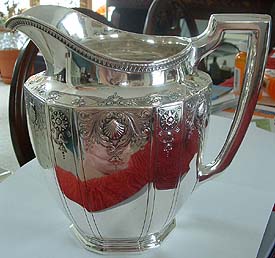
Sterling silver is an alloy of silver containing 92.5% by weight of silver and 7.5% by weight of other metals, usually copper. The sterling silver standard has a minimum millesimal fineness of 925.
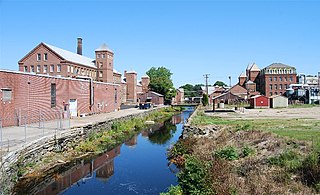
Reed & Barton was a prominent American silversmith manufacturer based in the city of Taunton, Massachusetts, operating between 1824 and 2015. Its products include sterling silver and silverplate flatware. The company produced many varieties of britannia and silver products since Henry G. Reed and Charles E. Barton took over the failing works of Isaac Babbitt in Taunton. During the American Civil War, Reed & Barton produced a considerable quantity of weapons for Union Army soldiers and officers.

The Gorham Manufacturing Company is one of the largest American manufacturers of sterling and silverplate and a foundry for bronze sculpture.
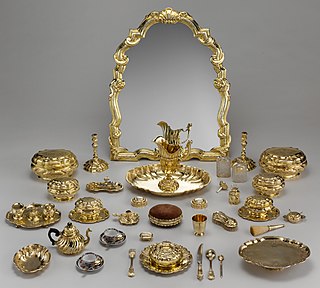
Household silver or silverware includes tableware, cutlery, and other household items made of sterling silver, silver gilt, Britannia silver, or Sheffield plate silver. Silver is sometimes bought in sets or combined to form sets, such as a set of silver candlesticks or a silver tea set.
Wallace Silversmiths is a major American manufacturer of sterling silver owned by Lifetime Brands.

Towle Silversmiths is an American silver manufacturer.
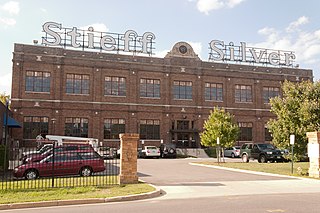
The Stieff Company, Silversmiths, Goldsmiths & Pewterers, located in Baltimore, Maryland, is also known as Kirk-Stieff after 1979.

A silver object that is to be sold commercially is, in most countries, stamped with one or more silver hallmarks indicating the purity of the silver, the mark of the manufacturer or silversmith, and other (optional) markings to indicate date of manufacture and additional information about the piece. In some countries, the testing of silver objects and marking of purity is controlled by a national assayer's office.

The F.W. Smith Silver Company is a historic factory building at 60 Chestnut Street in Gardner, Massachusetts. It was built in 1892 by Frank W. Smith, who had begun manufacturing sterling silver silverware in 1886. The business continued under a succession of owners until 1958. The building is locally distinguished for its late Victorian commercial style, including a tower with pyramidal roof, and stained glass windows. The building was listed on the National Register of Historic Places in 1979.

William B. Kerr Co. was a manufacturer of jewelry, flatware and hollow-ware. Established in Newark, New Jersey in 1855, they are listed in the 1915 Edition of the Trademarks of the Jewelry and Kindred Trades as having been located at 144 Orange St.
The Schofield Company (1903–1977) was a Baltimore area silver company, whose best known pattern was Baltimore Rose.

Roden Brothers was a Canadian tableware design and manufacturing company. It was founded on June 1, 1891 in Toronto by Thomas and Frank Roden. In the 1910s the firm became known as Roden Bros. Ltd. and were later taken over by Henry Birks and Sons in 1953. Roden Bros Ltd.'s silver was supplied by the province of British Columbia and with it they produced a wide range of silver holloware and flatware in traditional English styles. The company offered a variety of flatware patterns that included Stratford, Queens, and Louis XV. Goldsmiths Stock Company were their exclusive selling agents from 1900 to 1922. Roden Bros Ltd.'s mark included the word Sterling, followed by 925, an R and a lion passant. In addition to silver hollowware and flatware, Roden Bros. Ltd. produced cut crystal and medals. In 1974 Roden Bros. Ltd. published the book, Rich Cut Glass with Clock House Publications in Peterborough, Ontario, which was a reprint of the 1917 edition published by Roden Bros., Toronto.

William Dean Whiting was an American silversmith and jeweler. He was the founder of the Whiting Manufacturing Company, and "one of the most prominent jewelry manufacturers" in the United States according to the Boston Globe.
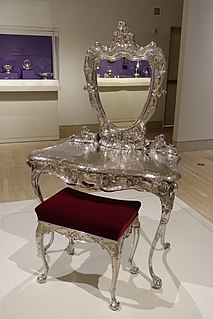
William Christmas Codman was a prominent silver and jewelry designer for Gorham Manufacturing Company of Providence, Rhode Island.

Gebelein Silversmiths was an American silversmith shop, active in Boston during the twentieth century.

Lewis Edwin Jenks was a noted American silversmith, active in Boston.

Barton Pickering Jenks was a noted American silversmith, active in Boston.

John Chandler Moore was a noted American silversmith, active in New York City. He worked exclusively for Tiffany & Co. after 1851 and his son, Edward Chandler Moore, became in charge of designing and manufacturing silverware at Tiffany.

George B. Sharp was an Irish-American silversmith, active in Philadelphia from about 1844-1874.

Shepherd and Boyd was an American silversmith partnership between Robert Shepherd and William Boyd, active at 136 Market Street, Albany, New York, from 1806 to 1830. Their work is collected in the Albany Institute of History & Art, Clark Art Institute, Metropolitan Museum of Art, Museum of Fine Arts, Boston, and Yale University Art Gallery.


















